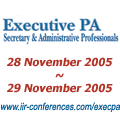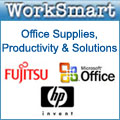
 Did you know that it takes half the energy to produce paper through recycling than it does pulping trees? That government reports predict that we will run out of available landfill sites by the end of this decade? That 12 jobs can be created for every 1,000 tonnes of waste paper recycled. That the things they throw away typically costs companies 4.5% of their turnover? Using environmentally-friendly office products and recycling wherever possible not only saves natural resources but makes economic sense too.
Did you know that it takes half the energy to produce paper through recycling than it does pulping trees? That government reports predict that we will run out of available landfill sites by the end of this decade? That 12 jobs can be created for every 1,000 tonnes of waste paper recycled. That the things they throw away typically costs companies 4.5% of their turnover? Using environmentally-friendly office products and recycling wherever possible not only saves natural resources but makes economic sense too.
There are two sides to a green office – and we're not talking paint and plants:
- Don't throw things away unnecessarily. When you do have to discard items make sure everything possible is salvaged for recycling.
- Buy items made from recycled materials.
Businesses tend to view recycling as a cost rather than a saving. In fact recycling takes little if any extra effort and can save money. Paper is one of the 'traditional' materials for recycling and, in spite of electronic communications, still makes up about 70% of office waste. Reduce the amount of paper you use by thinking about whether you need a hardcopy at all. Can you put notices on a staff intranet? Save a document to disk or CD rather than printing it? Print only the part of the document which you need? If you must have a hardcopy then use both sides of the paper. Most equipment can be set for double-sided printing/copying and printing on both sides of A4 paper saved one company £4,000 per year. If you're doing multiple copies remember to re-set to single-copy printing as the next user may not check.
Make it easy on them!
If people have to carry paper a long way to recycling bins then they won't bother – and it's a waste of time anyway. Install recycling bins for waste paper beside desks, printers and copiers and make sure that you have separate bins for white and coloured paper. Only by offering sorted white waste does it become viable for recyclers to collect mixed waste of lower value from small firms. If they're emptied regularly they needn't be very large. Make sure that staff know what they're for and that they're adequately labelled.
When buying new paper products try to purchase recycled. Some office suppliers specialise in offering recycled stationery and most offer at least a small selection. Papermaking technology has improved tremendously over the last thirty years and many recycled papers are now indistinguishable from virgin equivalents as well as being competitively priced. Other recycled paper products such as napkins, washroom towels and toilet rolls are not only economically priced they're particularly environmentally friendly as they often use the lowest grade of recycled paper, unsuitable for high-level office stationery.
Packaging is often expensive, but a rethink can save a lot of money and still be environmentally friendly. Padded bags can be reused, card from the back of notepads makes good envelope stiffeners and recycled corrugated cardboard is as good as bubble wrap. You can even turn waste into something useful; paper from the shredders makes excellent packaging around boxed items. It's cheap, available on site and much greener than the polystyrene chips so often used.
Recycle those cartridges!
Printer, fax and copier cartridges aren't biodegradable but can be recycled. Green Agenda provides recycling bins and, once you have ten or more cartridges, arranges for them to be collected. The firm even pays you for the used cartridges so your firm makes money directly from its rubbish.
Reconditioned printer cartridges are available from many IT suppliers and can be recycled again once empty. Aluminium cans such as those dispensed from vending machines can also be sold for cash through an office recycling scheme; recycling just one can saves enough energy to run a television for three hours. Less obvious items for recycling are plastic vendor cups. Save a Cup provides a cup stacking bin system and makes regular collections for the used cups. You could close the loop by buying pencils from Remarkable; each is made from a single recycled vending cup.
We've all got half a dozen writing implements around our desks, but how many of them are biodegradable, or better still, can be refilled? Fountain pens are making a comeback and bottled ink is cheap. If pens are not refillable, make sure that you exhaust the ink before throwing them away. The Green Stationery Company supplies a huge range of environmentally-friendly office equipment including letter trays made from juice cartons, OHP films made from clear plastic bottles, pinboards made from newsprint and recycled storage boxes where all royalties go to WWF.
Electrical equipment becomes obsolete so quickly that buying reconditioned is not usually an option for businesses. Check the equipment's energy consumption as it varies considerably. As well as taking up less space, multi-function equipment (printer/fax/scanner combinations, etc.) uses fewer resources in its manufacture and disposal. Office Green Technologies recycles all sorts of defunct office equipment, including mobile phones, IT equipment.
Green offices make not only environmental but also economic sense. 90% of rubbish in the UK goes into landfill. In Switzerland the figure is 20%. Small things make a big difference; the trick is to reduce, reuse and recycle.
Envirowise
www.envirowise.gov.uk
Green Agenda
www.greenagenda.com
Green Spectrum
www.greenspectrum.co.uk
Industry Council for Electronic Equipment Recycling
www.icer.org.uk
London Sustainability Exchange
www.lsx.org.uk
Office Green Technologies
www.officegreen.co.uk
Paperback
www.paperback.coop
Remarkable
www.remarkable.co.uk
Save a Cup Recycling Company
www.saveacup.co.uk
The Green Stationery Company
www.greenstat.co.uk
Think cans
www.thinkcans.com







